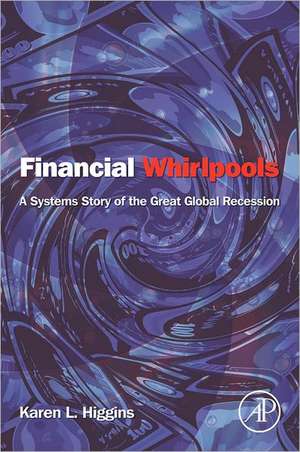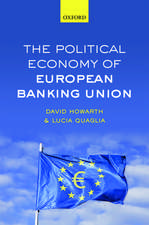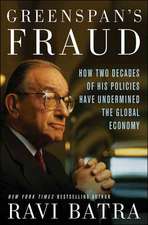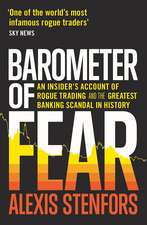Financial Whirlpools: A Systems Story of the Great Global Recession
Autor Karen L. Higginsen Limba Engleză Paperback – 3 iun 2013
- Presents a broad global view of international economic health and international corporate health
- Describes how policies, regulations, and trends dating to the 1950s influenced the crisis
- Assumes readers possess a general familiarity of economics and finance
Preț: 213.99 lei
Preț vechi: 229.75 lei
-7% Nou
Puncte Express: 321
Preț estimativ în valută:
40.95€ • 42.60$ • 33.81£
40.95€ • 42.60$ • 33.81£
Carte tipărită la comandă
Livrare economică 07-21 aprilie
Preluare comenzi: 021 569.72.76
Specificații
ISBN-13: 9780124059054
ISBN-10: 0124059058
Pagini: 400
Dimensiuni: 152 x 229 x 23 mm
Greutate: 0.64 kg
Editura: ELSEVIER SCIENCE
ISBN-10: 0124059058
Pagini: 400
Dimensiuni: 152 x 229 x 23 mm
Greutate: 0.64 kg
Editura: ELSEVIER SCIENCE
Public țintă
Primary: upper-division undergraduates and graduate students worldwide studying the 2008 financial crisis and financial crises in general.Secondary: people interested in financial risk management and operational research.
Cuprins
PART I FOUNDATIONS1. LINES OR CIRCLES: The Basics of Systems Thinking
2. AS THE GEARS TURN: Policies, Practices, Markets, and Risk
PART II YIN: HUMAN BEHAVIORS
3. WHERE CAN I BUY ONE? Humans and the economy
4. WHO ARE YOU ANYWAY? Values, beliefs, and behaviors
5. VISIONS OF GRANDEUR: Expectations and behaviors
6. A CRISIS OF HUMAN PROPORTIONS: Ethics and behaviors
7. SELF SPEAKS LOUDLY AND CARRIES A BIG STICK: Sources of unethical behavior
PART III YANG: ECONOMIC MECHANICS
8. WHAT GOES UP MUST COME DOWN: The Housing Bubble
9. ON TOP OF DEBT MOUNTAIN: High Risk Loans and Credit
10. THE RISK TIGER POUNCES: Financial Market, Risk, and Securitization
PART IV YIN AND YANG: INTEGRATION
11. HUMAN ROOTS ARE DEEP: Yin meets Yang
12. CONCLUSIONS
Appendix A
Appendix B
2. AS THE GEARS TURN: Policies, Practices, Markets, and Risk
PART II YIN: HUMAN BEHAVIORS
3. WHERE CAN I BUY ONE? Humans and the economy
4. WHO ARE YOU ANYWAY? Values, beliefs, and behaviors
5. VISIONS OF GRANDEUR: Expectations and behaviors
6. A CRISIS OF HUMAN PROPORTIONS: Ethics and behaviors
7. SELF SPEAKS LOUDLY AND CARRIES A BIG STICK: Sources of unethical behavior
PART III YANG: ECONOMIC MECHANICS
8. WHAT GOES UP MUST COME DOWN: The Housing Bubble
9. ON TOP OF DEBT MOUNTAIN: High Risk Loans and Credit
10. THE RISK TIGER POUNCES: Financial Market, Risk, and Securitization
PART IV YIN AND YANG: INTEGRATION
11. HUMAN ROOTS ARE DEEP: Yin meets Yang
12. CONCLUSIONS
Appendix A
Appendix B
Recenzii
"This work applies ‘systems thinking’ (drawing on insights from economics, psychology, philosophy, ethics, and management) in order to analyze the dynamics of the global economic crisis that began in 2008. Unlike linear thinking, the systems framework takes into account such dynamics as feedback Loops, Lags between decisions and actions, Limits to systems such as the economy, and Levers for applying change in the most effective manner." --Reference & Research Book News, December 2013
"This book delivers revealing insights about how systems theory can inform the way we think about financial systems. It has the power to change the way we think about economic crises." --Luke Houghton, Griffith University, Australia
"Financial Whirlpools insists that the economy must be studied as a complex whole that is capable of producing unexpected results and brings these insights to bear on the financial sector. The book is a welcome departure from the individualistic and mechanistic thinking that blinded a profession to the possibility of the recent financial crisis." --Mark Setterfield, Trinity College, US
"This book delivers revealing insights about how systems theory can inform the way we think about financial systems. It has the power to change the way we think about economic crises." --Luke Houghton, Griffith University, Australia
"Financial Whirlpools insists that the economy must be studied as a complex whole that is capable of producing unexpected results and brings these insights to bear on the financial sector. The book is a welcome departure from the individualistic and mechanistic thinking that blinded a profession to the possibility of the recent financial crisis." --Mark Setterfield, Trinity College, US














